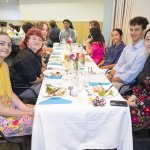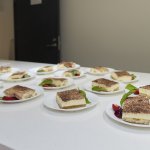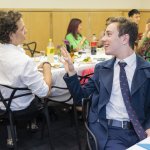How can you improve your wellbeing?
Dr. Sue Morris has a passion for enhancing students’ success and wellbeing, with an emphasis on positive psychology and resilience. Over 25 years of undergraduate teaching at UNSW, she has focused on developing innovative and engaging learning experiences for students, emphasising collaboration and connectedness (with a smattering of humour), as well as providing staff development for educators across the university. She is the lead author of the book The Rubber Brain: A toolkit for optimising your study, work, and life, which, together with her courses on wellbeing, are designed to help students to optimise their thinking and behaviour, particularly in response to the challenges of university. She applies psychological literacy in her teaching, which is about applying psychological science to help better ourselves and society, with a goal to “optimise the world, one student at a time”.
My fellow Mandelbaum House residents and I were such fortunate students, as Dr. Sue Morris was the guest speaker at the college’s first formal dinner of the year.
A colourful lady, both in dress and personality, her talk on wellbeing and the role of positive psychology in optimising oneself were empowering for us all. Her message was particularly poignant for us as this week was the first week of university and the stress from our coursework would soon be ramping up.
Dr. Morris emphasised the psychological concept of appraisal. Our brain receives stimuli from our senses, and then interprets this, resulting in our feelings and thoughts about our situation. This process of interpretation, this ‘appraisal’, is invisible to us: we only see the situation and how we feel about it: We missed the train, we will be late to the party so it’s the end of the world. We feel upset, annoyed, and angry. However, as Dr. Morris taught us, we have the power to alter this appraisal: We missed the train, so that’s okay, and we can let our friends know we will be late. We can catch the next train. By changing our appraisal, we can reduce our stress and improve our wellbeing.
She explained the ways in which our brains try to sabotage us and what we can do to mitigate this. One ‘sub-optimal brain habit’ that stood out to me was what Dr. Morris termed ‘mind-reading’, when we assume the worst regarding what other people think of us when, in truth, we don’t know what anyone but ourselves is thinking. By identifying these ‘sub-optimal brain habits’ we can prevent them from infiltrating into our daily lives.
In addition to identifying the less optimal, she highlighted strategies to improve our brains and lives such as meditation, socialisation, and exercise. Strategies I hope to use as the semester progresses!
Equipped with this newfound insight, I hope that we can all prepare ourselves for the semester ahead and make changes to our mental habits that will hopefully last our whole lives, benefiting not only ourselves, but those around us too.
As Dr. Morris puts it, “by optimising ourselves, we can optimise the world”.
Written by: Annika Oakley, Mandelbaum resident
Photographer: Sam Babus, SB Creatives Photography












